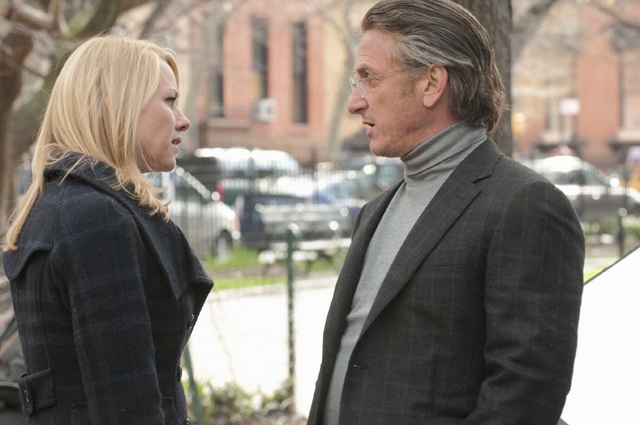Doug Liman, “Fair Game” (2010)

Picture Source: Melinda Sue Gordon for Warner Bros Pictures, www.hollywoodchicago.com
A few weeks ago (early December 2010), I went to a talk at an adult education centre in Sydney and the speaker there, Keith Suter, who is a consultant and lecturer on international affairs, recommended to the audience that they see this film so out of curiosity I did. I had heard of Valerie Plame some years ago and knew the events surrounding her exposure as a CIA agent by Wall Street Journal columnist Robert Novak in July 2003, and her connection to former US ambassador Joseph Wilson (he’s her husband) who published an article “What I didn’t find in Africa”, detailing his fact-finding trip to Niger to see if Iraq had sought and bought uranium from that country, and finding no evidence that Iraq had done so, for the New York Times a week before her outing. The movie concentrates mainly on Wilson’s belligerent and energetic attempts to expose the US government’s deliberate use of information to lie to the public and lead the country into an unwanted war, and the toll his actions and the media circus take on his marriage and on Plame herself, with a message about how democracy depends on the individual’s willingness to stand up for truth and fight for what is right.
Sean Penn as Wilson is passionate and preachy and the actor really throws himself into the role. As for Plame herself, the figure around which everything supposedly revolves, Naomi Watts does a competent multi-tasking job: the adoring wife who throws dinner parties (even if dinner is Chinese takeaway) and keeps her opinions to herself, the devoted mother of twin preschoolers, and the ultra-loyal CIA agent who manages several teams of operatives, convinces a doctor to go to Iraq to get information off her nuclear scientist brother and who, during training, was the last of a group of recruits to break down under psychological and physical pressure and torture. Yep, she’s an all-round brainy blonde. Wikileaks main man Julian Assange would definitely fall in love with her. Strip the roles away from Plame though and she turns out an unappealing character who, strangely, refuses to defend herself even though the government and the corporate media are spreading lies about her and her husband. I can’t see any passion or other distinctive personality trait in Watts’s Plame that attracted Penn’s Wilson in the first place. I see a good actor wasting her time playing yet another good-girl role – being loyal to her employer, being loyal to the government, not making waves, trying to be all goodie-two-shoes things to all people – in a long line of good-girl roles. Maybe Lars von Trier should be prevailed upon to throw Watts a line and draw her in to play one of his anti-heroines in yet another crazy von Trier creation?
The only people in the film I really feel anything for are the doctor (Liraz Charhi) who fled Iraq years ago and who risked her life to return there and make contact with her brother Hammad (Khaled Nabawy) under Plame’s direction and promises, and the brother himself and his family. When US forces begin bombing Baghdad, Hammad tries to get his wife and three children out of the country but the family is ultimately stranded on the verge of escape once Plame is outed and all her work allocated and dispersed among unseen paper-shufflers. The doctor loses all contact with the family and confronts Plame personally about their disappearance. Of course Plame has no answer – she can’t even say sorry (which must say something about how brainwashed she’s been by years of working for the CIA) – and the doctor leaves her in tears. The film never reveals what happened to Hammad and his family but from what I have been able to find out from reading various blogs and websites, the intellectual, artistic and professional classes in Iraq have been subjected to cultural genocide by Shi’ite militants and others, and many of these people have fled the country to avoid kidnapping and murder. I imagine a fair few of these people have attempted to make hazardous voyages on flimsy Indonesian fishing boats across the Timor Sea to Australia and drowned on the way; and if they didn’t drown, they’re wasting away in detention centres while politicians and the media in Australia denounce them as queue-jumpers. As of late 2010, the United Nations High Commissioner for Refugees estimated that Iraqis formed the second largest group of refugees in the world with over 1.8 million people living outside Iraq alone and a total of 4.7 million having been displaced as a result of the US invasion.
The CIA is presented as a typical faceless and bureaucratic organisation rent by office politics; it’s an organisation that demands a great deal from its employees but spits them out and hangs them out to twist and turn helplessly under the harsh media spotlight when it suits. All the “good” work Plame does for the organisation vanishes once she goes. Yes, I put the word in inverted commas because some of that work must have included blackmail and bribery, running guns to shifty and unreliable allies, and the odd “disappearance” of a wanted person, among other things. It’s not for nothing that in some countries, the CIA is synonymous with murder and corruption in high places.
Did I like the movie? Well, yes and no: I liked the acting but the family life stuff is so-so Hollywood and the script ultimately plumps for a lame up-beat ending in which Wilson harangues an audience about standing up for democracy when all the way through the film it’s apparent that it will take more than just lots and lots of individuals to stand up to the lies, misrepresentation and endemic corruption in the White House that didn’t end once George W Bush left the presidency.